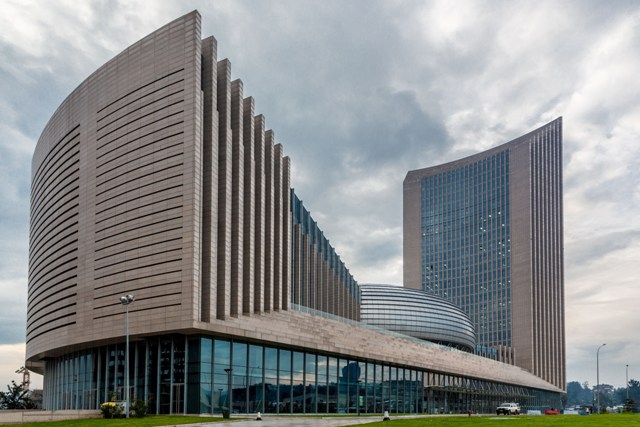 African Union headquarters in Addis Ababa, Ethiopia. [photo: Alamy]
African Union headquarters in Addis Ababa, Ethiopia. [photo: Alamy]
[This is an excerpt from an article in The Round Table: The Commonwealth Journal of International Affairs. Opinions do not reflect the position of the Round Table Editorial Board.]
For its advocates, Britain’s referendum in 2016 to leave the European Union promised a new golden age of trading relations with its former colonies. Commonwealth nations, jilted as trade partners when Britain joined the European Community in 1973, were now touted by Brexiteers as ‘oven-ready’ alternatives to the European Union. The idea of Britain profiting by replacing its market access to Europe by striking new agreements with the Commonwealth has, however, provoked considerable scepticism.
Above all these difficulties in re-establishing meaningful trade with the Commonwealth, there looms a formidable obstacle. Another country has beaten Britain to the punch: China. The People’s Republic’s astronomical rise has been boosted by the massive infrastructural investments of its ‘Belt and Road’ initiative (BRI). This has featured the construction of roads and railways through Central Asia to Pakistan, meeting at ports such as Gwadar, connecting Asia to East Africa, where China has again driven a boom in infrastructure construction.
Nonetheless, detractors of the BRI have warned that the contracts behind it constitute a form of ‘debt trap’. These fears seemed realised in 2017 when Sri Lanka ceded the port of Hambantota to a Chinese state-owned enterprise after failing to repay loans to the Chinese Development Bank. Despite political resistance in Sri Lanka to taking further loans from China, Chinese political lobbying supported the election of strongman Mahinda Rajapaksa who relinquished the port on lease. However, Chatham House argues that the events that led to the leasing of the port were largely driven by Sri Lankan leaders such as Rajapaksa himself and that the claim that the port can be used by the Chinese navy is purely ‘erroneous’.
Nevertheless, Chinese money and infrastructural expertise are readily sought across many developing countries. The hacking scandal of the African Union offices in 2018 represented a litmus test of how African states perceive China. The new headquarters which were inaugurated in 2012 in Ethiopia’s Addis Ababa had been built as ‘China’s gift to Africa’ ($200m). This ‘gift’ provided a backdoor for Chinese intelligence, as nightly data dumps were beamed to a remote server in Shanghai, together with inbuilt microphones in the walls. When uncovered, the African Union did not condemn China, with one high ranking diplomat retorting that China had never colonised Africa, whilst calling out Britain’s bugging of the former headquarters in 2009–2010.
The Commonwealth’s mantra of upholding democracy and human rights may confer on Britain a degree of ‘soft power’, yet when it comes to securing financial agreements, China’s ‘no questions asked’ approach to its partners is markedly more successful. Three of the Commonwealth’s most turbulent members have become key states in China’s BRI. Pakistan was suspended from the Commonwealth in 1999 after a military coup. It was in this period that Chinese interest in constructing a port at Gwadar peaked, following a state visit from Chinese Premier Zhu Rhongji in 2001. Whilst there was an uproar over the 2013 Commonwealth Heads of Government Meeting (CHOGM) in Sri Lanka following human rights abuses committed by the Sri Lankan army in its civil war, Rajapaksa took a considerable loan ($757m) from China for the expansion of Hambantota port. In Zimbabwe, which was suspended from the Councils of the Commonwealth in 2002 and faced European and American sanctions the following year, Chinese trade and investment grew exponentially, allowing Mugabe to forge ahead with his controversial land reforms. Mugabe declared: ‘We have turned East, where the sun rises, and given our backs to the West, where the sun sets’.
Access to cheap Chinese credit, no matter the regime, has led to accusations of corruption, poor governance, and authoritarianism, undermining the Commonwealth’s core mission. Nonetheless, the ubiquity of Chinese money has not entirely replaced the appeal of Commonwealth membership.
Thomas Gidney is a graduate of the Institute of International and Development Studies, Geneva, Switzerland.



